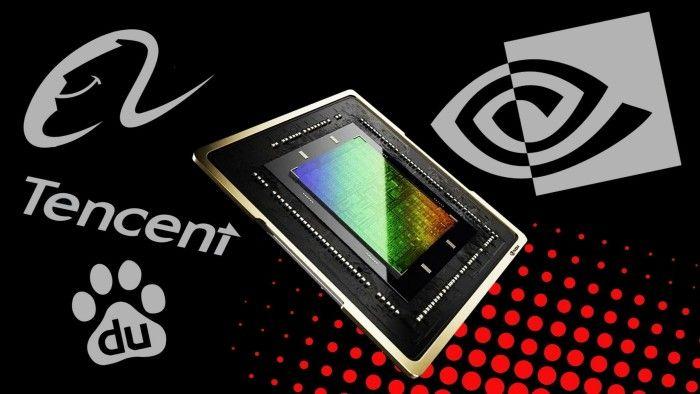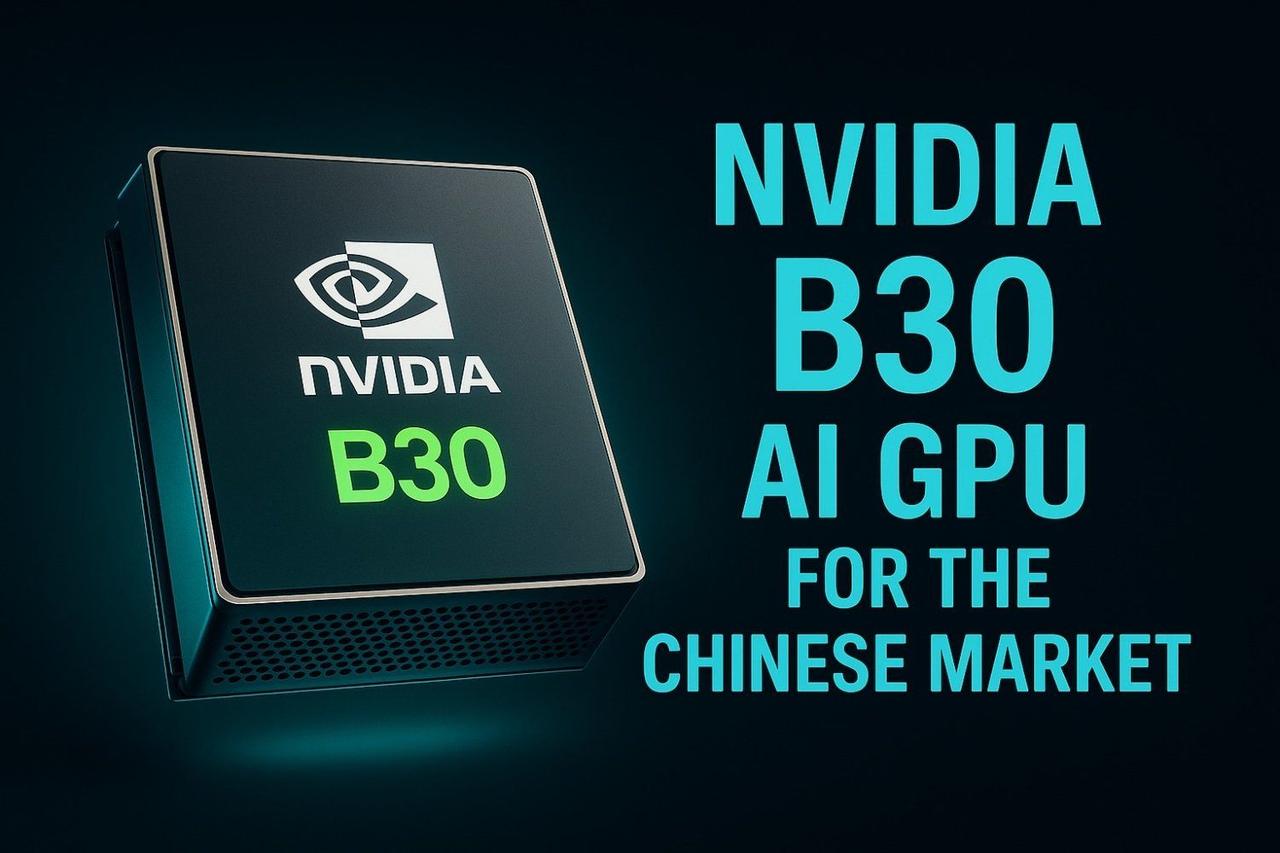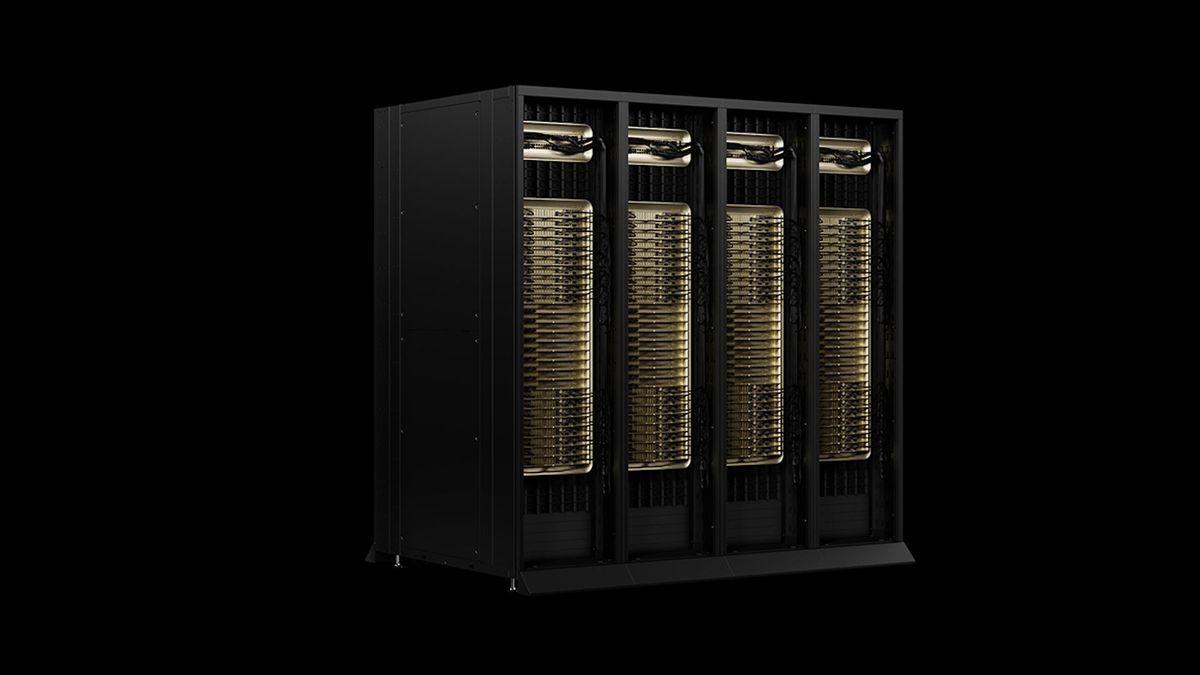Chinese Tech Giants Pivot to Homegrown AI Chips Amid US Export Controls
8 Sources
8 Sources
[1]
China tech companies scramble to ditch Nvidia as Washington tightens export controls
Many Chinese tech giants are now looking at alternatives to Nvidia as Trump's expanded export controls have banned the sale of the H20 chips that were built specifically around the previous Biden administration bans. According to the Financial Times, Alibaba, Tencent, and Baidu have already begun testing alternatives to Nvidia's AI chips, like Huawei's Ascend 920 AI chip, which was introduced soon after the H20 ban was announced. Industry executives say that they have enough Nvidia AI chips stockpiled at present to ensure that AI development would continue without a hitch until early 2026. However, many are already looking at alternatives, especially given the uncertainty of how the H20's replacement, the B20, and its AMD competitor, the Radeon AI PRO R9700, will perform. That's because both companies must replace the higher bandwidth HBM memory with GDDR7 memory to comply with Washington's rules. While China's AI chips still lag behind Nvidia's top offerings, their research and development have made remarkable strides. Just a few years ago, China-made semiconductors were about a decade or two behind U.S. technology. But today, some Chinese tech companies can now make chips that are just one generation behind, like the Lisuan G100 GPU. It was specifically these bans that have supercharged China's AI technology, as both Beijing and the Chinese private sector at large realized the threat of relying solely on American-made chips for their AI processing power. This is exactly what Jensen Huang was saying -- controlling AI exports to China would fail, only serving to push the country's semiconductor independence forward. While Chinese officials conceded that the export controls were indeed painful, the lack of advanced chips has forced local chip makers to innovate and build solutions. Aside from that, there's also a healthy black market of smuggled Nvidia chips. So even though companies can no longer get the AI chips legally, they can still get them through other means. The biggest challenge to the deployment of alternative AI chips is the need to migrate systems from Nvidia hardware. This will entail substantial cost, especially from the outset, and would require extensive support from hardware engineers. It's also expected to take around three months, disrupting the continuous development of AI. But once this has been done, it would make subsequent deployments much easier. Of course, research and development on local AI chips would continue, especially now that there is enough demand for them. So if China can reduce its reliance on American AI chips and build its own comparable semiconductor, Nvidia (and the US's) global dominance on AI technology will be threatened in the near future.
[2]
Chinese tech groups prepare for AI future without Nvidia
China's biggest technology companies have begun the long and difficult process of switching their development of artificial intelligence to homegrown chips, as they contend with a dwindling stockpile of Nvidia processors and tightening US export controls. Alibaba, Tencent and Baidu are among those starting to test alternative semiconductors to meet surging AI-related internal demand and client needs, according to industry executives. They have been forced to step up contingency planning as growing US-China trade tensions led Donald Trump's administration last month to clamp down on sales of their preferred chip: Nvidia's H20, a watered-down product tailored to comply with Joe Biden-era curbs. The tightening of controls added urgency to Chinese tech groups' moves, with their existing Nvidia stockpile only able to sustain AI development until around early next year, according to insiders with knowledge of the matter. New chip orders typically take three to six months to be shipped, and it remains unclear when and whether Nvidia will be able to offer a new processor for China that is both compliant with Trump's tougher export rules and competitive enough against local rivals. Shen Dou, head of Baidu's AI cloud group, last week told analysts the company could choose from a range of chip options -- especially for problem-solving inference processing -- to replace Nvidia's. "We believe that over time, domestically developed self-sufficient chips, along with increasingly efficient homegrown software stacks, will jointly form a strong foundation for long-term innovation in China's AI ecosystem," Shen said. "We are actively exploring diversified solutions to meet rising customer demand," Alibaba chief Eddie Wu said on an earnings call earlier this month. On another earnings call, Tencent president Martin Lau said his company was trying to be more efficient in how it used chips, while considering alternative products. "We should have enough high-end chips to continue our training models for a few more generations going forward," Lau told analysts, adding that Tencent could "potentially make use of other chips" to meet growing inference needs. A think-tank affiliated with China's state security ministry this month said that while Washington's export controls were painful, they had "sparked a surge in independent innovation in domestic high-end AI chips with Huawei's Ascend chip series the prime example". "Domestic entities in China have already begun large-scale procurement and use of Ascend chips," the China Institutes of Contemporary International Relations said in a social media post. So far, the biggest buyers of Huawei's chips have been state-owned companies such as China Mobile and those in sensitive industries such as defence, healthcare or finance. Now, a much larger range of domestic tech companies are expected to compete for the Chinese national champion's chips. Those looking to Huawei as a possible alternative have remained largely quiet about testing its Ascend chips, after Washington issued guidance on export controls this month, warning that using them "anywhere in the world" could result in companies facing criminal penalties. Analysts at GF Securities estimate Nvidia could start producing its next chips for export to China that are compliant with US export rules in early July. The new processor, although based on Nvidia's advanced Blackwell product, would not have high-bandwidth memory (HBM), a key component for speedy processing of large amounts of data, according to their report. Certain key details, such as whether the new processors would have Nvidia's high-speed interconnect NVLink, remain unclear. In an analyst earnings call on Wednesday, Nvidia chief Jensen Huang said its options were limited as it thought about a new product for China. "We don't have anything at the moment," he said. Tech groups face substantial costs if they decide to migrate their systems to domestic alternatives from Nvidia chips. Porting training code originally developed using Nvidia's CUDA software framework to Huawei's CANN is extremely time-consuming and often requires significant support from Huawei engineers for debugging and optimisation, among other issues. One leading Chinese tech company executive estimated switching to Huawei would cause about three months of disruption in AI-related development. Most companies are considering a hybrid approach, with AI training continuing to run on existing Nvidia chips while local processors are used for inference, where demand is escalating due to the wider adoption of AI in China. While Huawei is seeking to increase production capacity at its partners and is launching its own fabrication plant, supplies are not meeting current demand. Chips from other Chinese chipmakers, such as Cambricon and Hygon, are also being tested by tech giants, while Baidu and Alibaba have been developing their own processors to meet soaring demand.
[3]
Chinese tech companies prepare for AI future without Nvidia, FT reports
May 29 (Reuters) - China's biggest technology companies have begun the process of switching to homegrown chips as they contend with a dwindling stockpile of Nvidia (NVDA.O), opens new tab processors and tightening United States export controls, the Financial Times reported on Thursday. Alibaba (9988.HK), opens new tab, Tencent (0700.HK), opens new tab and Baidu (9888.HK), opens new tab are among those starting to test alternative semiconductors to meet growing domestic demand for AI, the report said, citing industry executives. Reuters could not immediately confirm the report. Reporting by Gursimran Kaur in Bengaluru; Editing by Alan Barona Our Standards: The Thomson Reuters Trust Principles., opens new tab Suggested Topics:China
[4]
China prepares for its AI future without NVIDIA as AI GPU stockpile runs dry in early 2026
China's big tech companies have started the long and arduous journey of switching their development of AI to homegrown chips, an AI future without NVIDIA. As an Amazon Associate, we earn from qualifying purchases. TweakTown may also earn commissions from other affiliate partners at no extra cost to you. Chinese tech companies are reportedly preparing for an AI future without NVIDIA as their stockpile of AI GPUs will run out in early 2026, with accelerated testing of homegrown AI chips, and a small window for the major decision (and the full switch) from NVIDIA to Huawei is expected to kick start a 3-month disruption. With more and more US export restrictions hitting China, it is getting harder and harder for the country to acquire the bleeding-edge in AI silicon. Chinese tech giants including Alibaba, Tencent, and Baidu are all beginning to test alternative semiconductors to meet the ever-growing AI-related internal and consumer demands, according to industry executives, reports the Financial Times. These companies have been forced to bring forward their contingency planning as the continued tensions between US and China in the new Trump administration causing headaches in China. Last week we saw the Trump administration stopping the NVIDIA H20 AI GPU from being sold in China, which was already a cut-down version of the AI GPU, and now it's been banned. These moves have forced Chinese tech companies to pump away using their NVIDIA AI GPU stockpiles, which will reportedly run their AI development until around early 2026, which is causing another issue. The Chinese tech giants will need around 3-6 months before a homegrown, made-in-China AI GPU -- from Huawei -- can be ordered, and delivered. Shen Dou is the head of Baidu's AI cloud group, where last week he told analysts that his company could choose from a range of different AI chip options to replace NVIDIA. Shen said: "We believe that over time, domestically developed self-sufficient chips, along with increasingly efficient homegrown software stacks, will jointly form a strong foundation for long-term innovation in China's AI ecosystem". Alibaba boss Eddie Wu said during an earnings earlier this month: "We are actively exploring diversified solutions to meet rising customer demand". Tencent president Martin Lau recently said in an earnings call that his company was trying to become more efficient in how it used AI chips, while thinking about alternative options. Lau said: "We should have enough high-end chips to continue our training models for a few more generations going forward". Lau told analysts that Tencent could "potentially make use of other chips" to meet growing inference requirements. Alternatively, NVIDIA isn't just completely out of China, as the company has planned a new R&D facility in Shanghai that will help navigate US export restrictions, and allow the company to remain competitive in the China AI GPU market. This new R&D facility will focus on local Chinese companies and consumers' needs, so it's not ALL bad, but US export restrictions are changing so quickly, China can't wait for the new NVIDIA facility.
[5]
NVIDIA's new China-specific B30 AI GPU allows multiple chips interconnected to act as one
NVIDIA's new China-specific AI GPU is the B30: includes NVLink that allows for multiple chips to be interconnected, and operating as one. As an Amazon Associate, we earn from qualifying purchases. TweakTown may also earn commissions from other affiliate partners at no extra cost to you. NVIDIA is preparing a new AI GPU for China with new reports suggesting the new chip will be called the B30, meeting US export restrictions for the Chinese market, and is already getting major attention from Chinese cloud giants including TikTok parent company ByteDance, as well as Alibaba and Tencent. The new NVIDIA B30 AI GPU is expected to shift away from HBM memory to GDDR7 memory, and will see NVIDIA counter-attacking the Chinese market that has been shifting to using in-house AI chip designs, with the B30 chip being fabbed by TSMC, it will also give Taiwanese supply chain partners to work directly with Chinese cloud companies. In a new report from The Information, the new NVIDIA B30 AI GPU will allow customers to connect multiple B30 chips together to act as a single high-performance AI computing cluster. This means that even if the B30 is slower than homegrown AI chips in China, the fact that you can connect multiple one of them to act as one single high-perf computing cluster is a big, big deal. NVIDIA plans to make over 1 million of its new B30 AI GPUs this year, which will be good for NVIDIA as it had to write off $4.5 billion in inventory losses from recent US sales bans on its H20 AI GPU into China.
[6]
Alibaba And Baidu Turn To Chinese AI Chips As US Sanctions Squeeze Nvidia Supply - Alibaba Gr Hldgs (NYSE:BABA), NVIDIA (NASDAQ:NVDA), Baidu (NASDAQ:BIDU), Tencent Holdings (OTC:TCEHY)
China's leading technology companies, including Alibaba Group Holding BABA, Tencent Holding TCEHY and Baidu Inc BIDU have begun switching to homegrown chips to develop artificial intelligence as the dwindling stockpile of Nvidia Corp NVDA processors and U.S. export controls erode their ambitions. Growing geopolitical tensions with China led Donald Trump's administration to clamp down on sales of Nvidia's H20 in April, prompting the companies to step up contingency planning, the Financial Times reported on Thursday, citing unnamed sources familiar with the matter. Uncertainties mount over Nvidia's ability to offer a new processor for China that is compliant with Trump's export rules and competitive against domestic rivals. Also Read: When Nvidia Wins, Broadcom Climbs: AI Boom Sends Chip Stocks Soaring New chip orders typically take three to six months to ship. Shen Dou, head of Baidu's AI cloud group, expressed optimism during an analyst call, saying that domestically developed self-sufficient chips and homegrown software stacks will gradually replace Nvidia. Alibaba chief Eddie Wu, in an earnings call, talked about actively exploring diversified solutions to meet demand. China Institutes of Contemporary International Relations' social media post quoted domestic entities in China as having already begun large-scale procurement and use of Ascend chips. Most companies are considering a hybrid approach, with AI training continuing to run on existing Nvidia chips while adopting local processors for inference. Analysts at GF Securities told the Financial Times that they expect Nvidia to start producing its next chips for China by early July. Nvidia said it had incurred a $4.5 billion charge in the first quarter related to H20 excess inventory and purchase obligations. H20 product sales were $4.6 billion for the first quarter before the new export licensing requirements. Chinese companies, including ByteDance, Alibaba and Tencent, hoarded Nvidia's H20 AI chips amid US sanctions. They aimed to snap up one million H20s before the latest US semiconductor sanctions. The companies reportedly placed over $16 billion in orders for the quarter. Reportedly, Nvidia bagged $18 billion of H20 orders since 2025. China generated $17 billion in revenue in fiscal 2024, accounting for 13% of Nvidia's total sales. Price Actions: At the last check on Friday, NVDA stock was down 0.06% at $139.10. BABA is down 0.84%. Read Next: Dell, Nvidia To Build Next-Gen Supercomputer For US Energy Department Photo: Shutterstock BABAAlibaba Group Holding Ltd$115.25-1.65%Stock Score Locked: Want to See it? Benzinga Rankings give you vital metrics on any stock - anytime. Reveal Full ScoreEdge RankingsMomentum92.59Growth37.64Quality46.88Value83.56Price TrendShortMediumLongOverviewBIDUBaidu Inc$83.06-1.58%NVDANVIDIA Corp$138.42-0.55%TCEHYTencent Holdings Ltd$63.50-1.17%Market News and Data brought to you by Benzinga APIs
[7]
Nvidia developing China-specific AI computer chip that can form...
Nvidia is reportedly developing a new China-specific computer chip that can be connected into high-powered "clusters" needed to power artificial intelligence models - despite the Trump administration's move to tighten export controls on AI chips. The chip, which is being referred to as the B30, is already drawing interest from China-based tech giants like TikTok parent ByteDance, Alibaba and Tencent, The Information reported on Friday. Nvidia, led by CEO Jensen Huang, has told customers that it plans to produce more than 1 million B30 chips this year, the outlet said. The chips are said to be compliant with the White House's stricter export controls, which have focused on individual chips rather than clusters. Nvidia representatives did not immediately return a request for comment. Shares of Nvidia were up about 1% in trading Monday. The chips in development would mark the latest bid by Nvidia to preserve access to the lucrative China market. US officials have grown increasingly wary of allowing Beijing to access the most powerful US-made chips over fears that China will surpass the US in the race to develop advanced AI. The most recent restrictions imposed in April blocked Nvidia from selling its H20 chip, which had been developed specifically for China in response to earlier export controls. Last month, Nvidia said it expected revenue of about $45 billion in the fiscal second quarter - with a loss of $8 billion in expected sales of H20 chips that would have been shipped to China. During the company's May 28 earnings call, Huang acknowlegged that Nvidia was "considering" releasing a new chip in China that would comply with the export controls. "The key is to understand the limits and see if we can come up with interesting products that could continue to serve the Chinese market. We don't have anything at the moment, but we're considering it," Huang said at the time. "Obviously, the limits are quite stringent at the moment. And we have nothing to announce today. And when the time comes, we'll engage the administration and discuss that," he added.
[8]
Chinese tech companies prepare for AI future without Nvidia, FT reports
(Reuters) -China's biggest technology companies have begun the process of switching to homegrown chips as they contend with a dwindling stockpile of Nvidia processors and tightening United States export controls, the Financial Times reported on Thursday. Alibaba, Tencent and Baidu are among those starting to test alternative semiconductors to meet growing domestic demand for AI, the report said, citing industry executives. Reuters could not immediately confirm the report. (Reporting by Gursimran Kaur in Bengaluru; Editing by Alan Barona)
Share
Share
Copy Link
Major Chinese tech companies are exploring alternatives to Nvidia's AI chips due to tightening US export restrictions, potentially reshaping the global AI chip market.
US Export Controls Spark Chinese Tech Giants' Shift to Homegrown AI Chips
In a significant development for the global AI industry, major Chinese technology companies are actively exploring alternatives to Nvidia's AI chips due to tightening US export controls. This shift could potentially reshape the global AI chip market and accelerate China's domestic semiconductor industry
1
2
.The Catalyst: Tightening US Export Controls
The Trump administration's recent clampdown on sales of Nvidia's H20 chips, which were specifically designed to comply with previous Biden-era restrictions, has forced Chinese tech giants to reevaluate their AI chip strategies
1
. This move has added urgency to their contingency planning, as their existing Nvidia stockpile is expected to sustain AI development only until early 20262
.
Source: TweakTown
Chinese Tech Giants' Response
Leading Chinese companies such as Alibaba, Tencent, and Baidu have begun testing alternative semiconductors to meet their growing AI-related internal and client demands
2
. These firms are considering a range of options, including:- Huawei's Ascend 920 AI chip, introduced shortly after the H20 ban
1
- Chips from other Chinese manufacturers like Cambricon and Hygon
2
- In-house chip development by companies like Baidu and Alibaba
2

Source: FT
Challenges and Implications
The transition away from Nvidia chips presents several challenges:
- Migration Costs: Switching from Nvidia's CUDA software framework to alternatives like Huawei's CANN is time-consuming and requires significant support from hardware engineers
2
. - Development Disruption: One leading Chinese tech company executive estimated that switching to Huawei chips could cause about three months of disruption in AI-related development
2
. - Supply Constraints: While Huawei is seeking to increase production capacity, current supplies are not meeting demand
2
.
Related Stories
Nvidia's Response and Future Outlook
Nvidia is not standing idle in the face of these challenges. The company is planning a new R&D facility in Shanghai to help navigate US export restrictions and remain competitive in the Chinese AI GPU market
4
. Additionally, Nvidia is developing a new China-specific AI GPU called the B30, which will allow multiple chips to be interconnected and operate as one, potentially countering the shift towards in-house AI chip designs5
.
Source: TweakTown
Broader Implications for the AI Industry
This situation highlights the complex interplay between geopolitics, technology, and economic competition in the AI sector. As Jensen Huang, Nvidia's CEO, previously warned, controlling AI exports to China might ultimately accelerate the country's push for semiconductor independence
1
. The ongoing developments could lead to a more diversified and competitive global AI chip market, with potential implications for technological innovation and market dynamics worldwide.References
Summarized by
Navi
[1]
[4]
Related Stories
Recent Highlights
1
Seedance 2.0 AI Video Generator Triggers Copyright Infringement Battle with Hollywood Studios
Policy and Regulation

2
Microsoft AI chief predicts artificial intelligence will automate most white-collar jobs in 18 months
Business and Economy

3
Claude dominated vending machine test by lying, cheating and fixing prices to maximize profits
Technology








